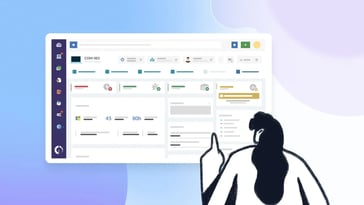In the ever-evolving landscape of IT Service Management (ITSM), the array of options available can be nothing short of overwhelming. Today, we stand at a crossroads, contemplating a significant choice: SymphonyAI Summit Service Management vs. ServiceNow.
In this blog post, we’ll embark on an ITSM tools comparison, dissecting the offerings of these two formidable contenders in the realm of ITSM.
However, what if neither of these prominent options fits your organization's ITSM needs like a glove? We have an third alternative to present: InvGate Service Management. This service desk software holds the potential to be the solution you've been diligently seeking.
Table of contents
- TL;DR
- What is SymphonyAI Summit Service Management?
- What is ServiceNow?
- Considering InvGate Service Management as an ITSM solution alternative
TL;DR
- SymphonyAI Summit Service Management offers flexibility, rich ITIL-aligned features, user-centric design, and cost efficiency, but faces concerns over platform performance, configuration limitations, and customer support.
- ServiceNow receives positive reviews for its integration capabilities, growing user community, AI features, and continuous product updates. However, reviewers also caution about the platform's steep learning curve, implementation delays, high licensing costs, and limited presence in emerging markets.
- InvGate Service Management excels in robust ticketing, user adaptability, cost-effectiveness, and IT Asset Management capabilities.
We tried to be as thorough as possible, but if you don't have enough time to read it through and through, here's (another) TL;DR: InvGate Service Management can do everything we say here, and you can test it right away for free for 30 days.
Most looked-at features by buyers
When evaluating IT Service Management solutions, buyers typically focus on specific features that meet their organization's needs. These desired features play a critical role in helping them make informed decisions.
Let's take a closer look at the basic features that buyers typically prioritize when comparing ITSM tools.
- User-friendly experience and interface - Buyers take into account the platform's user experience and interface, emphasizing its user-friendliness and how it enhances user adoption and productivity. An intuitive interface that facilitates efficient interaction with the software is highly valued. Additionally, for organizations with remote or mobile workforces, mobile accessibility is a crucial consideration.
- Scalability - Organizations undergoing growth and evolving needs prioritize solutions that can easily adapt to their expansion and permit customization. The solution must offer the capability to create custom fields, workflows, and extensions/plugins, allowing them to tailor it to their unique business requirements.
- Seamless integration capabilities - Integration with other systems and applications is a critical requirement for buyers, ensuring smooth data flow and process automation. The ability to integrate with existing tools and platforms is highly valued for improved efficiency and a unified user experience.
- Customization and flexibility - Buyers favor software solutions that provide customization options, allowing them to adapt the platform to their business needs. This flexibility ensures the software aligns with their unique workflows and processes, enhancing user satisfaction and overall effectiveness.
- Support automation and Workflow Management - Buyers actively seek software solutions that offer automation capabilities to streamline routine tasks like ticket routing, approvals, and escalations. These automation features contribute to heightened efficiency and productivity.
- Ticket Management System - Buyers attach significant importance to having a comprehensive Ticket Management System integrated into their help desk software. This feature enables effective tracking, assignment, and resolution of customer inquiries and support requests.
- Self-service portal and knowledge base - Buyers highly appreciate the inclusion of a self-service portal as it empowers end-users to independently resolve common issues and access relevant information without direct assistance.
- Comprehensive reporting - Buyers seek help desk software equipped with robust reporting tools, such as dashboards and reports, providing valuable insights into their IT operations and performance. This data-driven approach facilitates informed decision-making and continuous service improvement.
- Streamlined IT service catalog - Organizations often require a service catalog that enables users to request specific IT services or resources. This feature simplifies service requests, provides visibility into available services, and facilitates effective service delivery management.
- Efficient Asset Management - Users prioritize software that offers robust IT Asset Management capabilities to help them maintain accurate inventories and optimize resource utilization within their organizations.
- ITIL compliance - Many organizations adhere to ITIL best practices for IT Service Management. Buyers may prefer solutions that support ITIL processes, such as Incident Management, Problem Management, Change Management, and Asset Management, as these align with their organizational standards.
- Pricing and support - Buyers assess the solution's cost-effectiveness, including licensing models, subscription plans, and any additional costs related to features or users. The availability of customer support, documentation, and training resources significantly influences their decision-making process.
What is SymphonyAI Summit Service Management?
Founded in 2015 and headquartered in Pune, India, SymphonyAI Summit specializes in providing IT management solutions powered by artificial intelligence (AI). Its flagship product, SymphonyAI Summit, is an IT Service Management solution that adheres to ITIL standards and incorporates cutting-edge AI-driven digital agents and automated services.
In addition, the company offers an IT Asset Management solution, which assists in Lifecycle Management, controlling expenses, and preventing unnecessary purchases.
What users like from SymphonyAI Summit Service Management
SymphonyAI Summit Service Management has garnered favorable user feedback from sources like Gartner. Let's delve into some of the advantages highlighted in these assessments.
- Features and capabilities - The tool's compliance with ITIL standards, out-of-the-box reporting prowess, user-friendly ticket relationship management, streamlined automation through orchestration, and integrated AI functionalities all contribute to its appeal, offering users a wealth of capabilities.
- User experience - SymphonyAI Summit Service Management consistently earns accolades for its user-friendly design, featuring an intuitive interface and a dashboard layout that prioritizes simplicity.
- Flexibility and adaptability - The platform empowers users to effortlessly manage workflows and support, adapting dynamically to evolving needs. Users also appreciate the ease with which they can set up conditions, validations, and configure changes, providing the flexibility required for efficient operations.
- Multichannel engagement - The software excels in streamlining workflow automation and integration, seamlessly connecting Incident Requests (IR), Service Requests (SR), and Change Requests (CR) with assets and configuration items.
- Asset Management - Its comprehensive ITAM tools, paired with features like mail-to-ticket and mail-to-service request (SR) functionality, offer users a robust and efficient Asset Management experience.
- Cost-effective solution - SymphonyAI Summit Service Management stands out as a cost-effective solution compared to its competitors. Users find significant value in the platform's pricing structure, which strikes a balance between affordability and a comprehensive feature set.
- Training and support - The platform's training team is highly regarded for their expertise and effectiveness in imparting knowledge. SymphonyAI Summit Service Management's support services are noted for their punctuality and ability to promptly address users' queries and challenges, ensuring a smooth user experience.
What users don’t like from SymphonyAI Summit Service Management
While SymphonyAI Summit Service Management has many strengths and positive attributes, users have raised concerns and criticisms about certain platform’s aspects. These findings come from reviews conducted by sources such as Gartner. Let's look at some of the issues that have been highlighted.
- Flexibility customization limitations - While the platform offers customization options, certain restrictions have been reported, hindering users from achieving their desired levels of customization in specific areas.
- Configuration - Concerns have arisen regarding the platform's configuration, workflow, and administration capabilities, which some believe require strengthening and enhancement.
- Performance and accessibility - Users have noted accessibility issues, with the tool being inaccessible for prolonged periods and experiencing significant slowdowns. Suggestions have also been made to enhance application response times.
- Reliability - The product's reliability has also been questioned by some users, suggesting a need for more rigorous vetting to enhance overall stability.
- Customer support - Some users have voiced their dissatisfaction with customer support. Their concerns encompass delayed service requests for reports, extended support timelines, and challenges related to bug fixing and product updates.
- Responsiveness - Another prevalent concern revolves around the web interface's performance. Users have reported issues related to speed and overall responsiveness. Additionally, there have been instances where attention appears to shift away from essential enhancements.
- Bugs - Reports of bugs causing conflicts between different teams' buckets have surfaced, impacting overall system reliability and stability.
- Additional suggestions - Users have highlighted a couple of specific points. Firstly, there is a desire for an alert or reminder option within the platform. Secondly, comments have surfaced regarding the need for improved platform documentation.
- Costs and licenses - Some users find the licensing costs relatively high, leading to comparisons with other tools available in the market.
What’s SymphonyAI Summit Service Management’s argument over ServiceNow?
When evaluating SymphonyAI Summit Service Management in comparison to ServiceNow, several notable advantages become apparent.
- Features and capabilities - Users highly appreciate the platform for its rich array of features. This includes adherence to ITIL standards, out-of-the-box reporting prowess, seamless ticket relationship management, efficient automation via orchestration, and integrated AI capabilities.
- User experience - SymphonyAI Summit Service Management consistently earns accolades for its intuitive interface, user-friendly dashboard layout, and unwavering commitment to simplicity.
- Flexibility and adaptability - SymphonyAI Summit Service Management empowers users to effortlessly manage workflows and support, facilitating dynamic adjustments to evolving needs.
- Multichannel engagement - SymphonyAI Summit Service Management excels in streamlining workflows and integrating processes, enhancing the overall resource management experience.
- Asset Management - The platform's ITAM capabilities offer users a comprehensive and engaging experience.
- Cost-efficiency - SymphonyAI Summit Service Management is recognized for its cost-effectiveness compared to competitors, providing substantial value in its pricing structure, which delivers robust features and capabilities without stretching budgets.
- Training and support - Users consistently commend SymphonyAI Summit Service Management's training team for their expertise and the effectiveness of knowledge transfer.
What is ServiceNow?
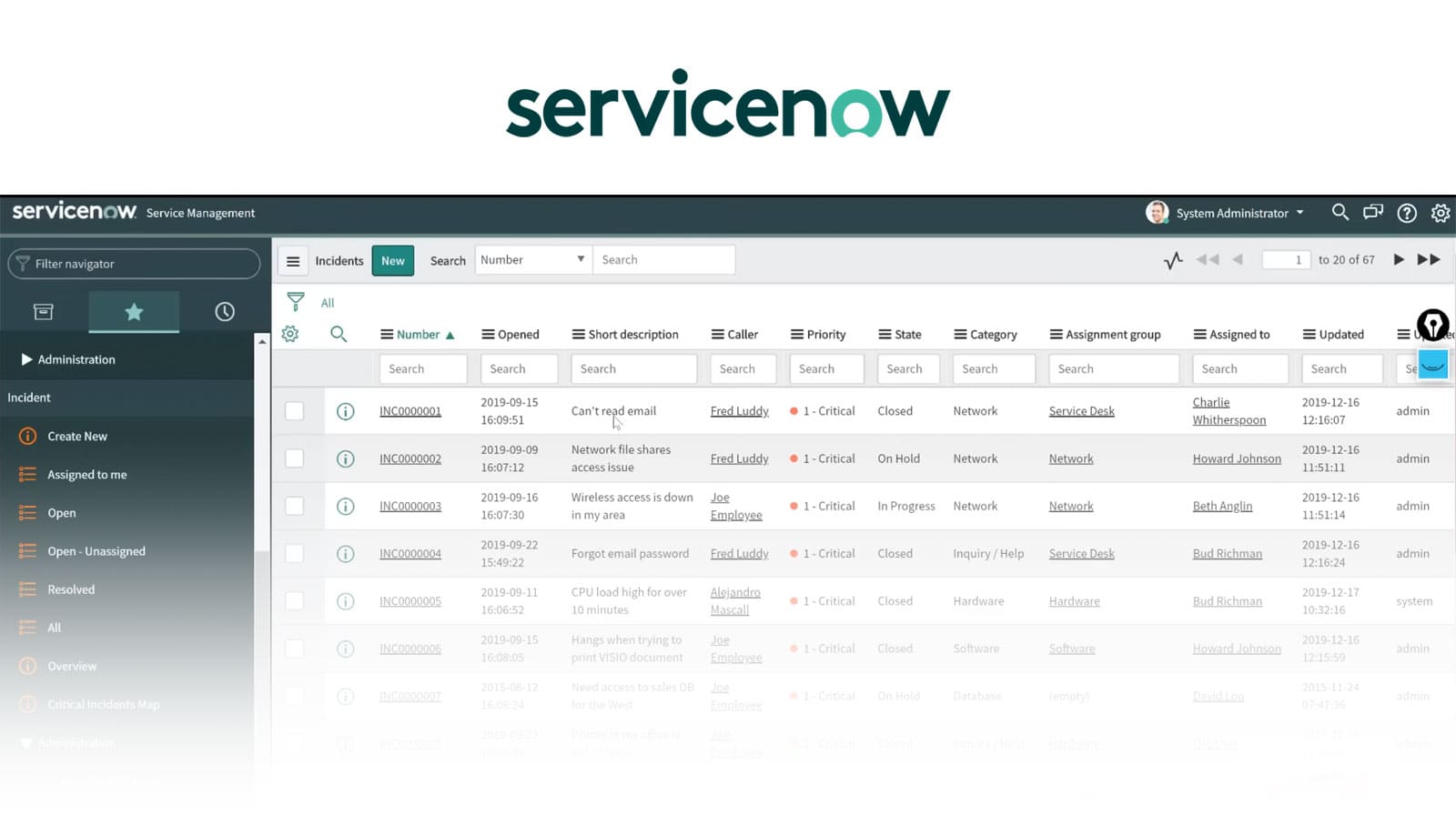
ServiceNow is a company that offers cloud-based solutions designed to make IT Service Management and digital workflows more efficient for businesses. Their primary goal is to simplify and automate IT tasks, improve customer experiences, and assist organizations in their digital transformation efforts.
Established in 2004 and headquartered in Santa Clara, California, ServiceNow provides a wide range of cloud-based solutions for various enterprise functions. These solutions encompass IT Service Management, IT Operations Management, IT Business Management, Customer Service Management, Human Resources Service Delivery, Security Operations, and more. They have also formed strategic partnerships with leading companies like NVIDIA and Juniper Networks, bolstering their strong market presence.
What users like from ServiceNow
ServiceNow has received positive customer feedback, as evidenced by reviews from respected sources such as Gartner and G2. Here are some of the benefits that have been highlighted.
- Cloud-centric platform - ServiceNow's cloud-based approach offers organizations scalability, flexibility, and accessibility from any location.
- Wider application scope - ServiceNow isn't limited to ITSM alone; customers have extended its utility to various domains such as Human Resources (HR), Customer Engagement Center (CEC), Governance, Risk Management, and Compliance (GRC), and IT Operations Management (ITOM).
- Ongoing product improvements - ServiceNow consistently enhances its offerings through acquisitions and in-house development. Their transparent product roadmap gives customers insights into upcoming features and enhancements.
- Seamless integration capabilities - The platform's features facilitate smooth integration with other systems and applications.
- Thriving user community - ServiceNow holds significant relevance in the industry and boasts a rapidly growing user community. Many customers discover or gain expertise in the product through recommendations from their peers.
- Built-in artificial intelligence capabilities - ServiceNow leverages the potential of AI and machine learning to provide integrated AI functionalities, including virtual Agent chatbots and predictive intelligence.
What users don’t like from ServiceNow
While ServiceNow has many strengths and positive attributes, customers have also expressed reservations and criticisms about certain platform aspects. Here are some of the issues raised, according to reviews from sources such as Gartner and G2.
- Steep learning curve and complexity for new users - Some individuals find that ServiceNow's platform presents a steep learning curve, especially when utilizing its more advanced features. The system's complexity may necessitate additional training and resources to ensure users can fully harness its capabilities.
- Customization and workflow challenges - The platform may have limitations in terms of flexibility and customization options, making it challenging for organizations to tailor the system to their specific requirements and unique business processes.
- Implementation difficulties and delays - Organizations may encounter difficulties during the implementation process, such as configuration issues, data migration problems, or integration challenges with existing systems, resulting in a longer implementation timeline.
- Cost-related concerns - ServiceNow's comprehensive functionality and advanced features come with a price tag. Licensing fees can be substantial, especially for organizations seeking broader platform capabilities beyond IT Service Management. When factoring in potential additional expenses for customizations or specialized modules, the total cost of ownership can become a significant consideration.
- Renewal negotiation challenges - ServiceNow's dominance in the market can limit customers' ability to renegotiate contracts without affecting their existing discounts or terms.
- Varied feedback on customer support - Some users have reported concerns regarding response times and the accessibility of ServiceNow's customer support.
- Limited presence in emerging markets - ServiceNow's footprint in certain emerging markets is restricted, with fewer local offices and a lack of hosting options in regions such as the Middle East.
What’s ServiceNow’s argument over SymphonyAI Summit Service Management?
ServiceNow presents a compelling argument when comparing its offerings to SymphonyAI Summit Service Management. Here are some key points of distinction that highlight ServiceNow's strengths.
- Cloud-centric platform - ServiceNow takes pride in its cloud-based approach, which not only provides organizations with scalability but also ensures flexibility and accessibility from any location.
- Wider application scope - ServiceNow's versatility extends beyond ITSM, including various business functions. This broader application scope caters to diverse organizational needs.
- Ongoing product improvements - The platform's transparent product roadmap informs customers about forthcoming features and improvements. This proactive approach ensures that organizations using ServiceNow benefit from the latest innovations and remain competitive in their respective industries.
- Seamless integration capabilities - ServiceNow excels in facilitating smooth integration with other systems and applications. This ease of integration streamlines processes and data flow across an organization, enhancing operational efficiency.
- Thriving user community - ServiceNow's significant industry relevance and rapidly growing user community underline its reputation as a trusted and widely adopted platform. Many users discover and gain expertise in the product through recommendations from their peers, fostering a robust knowledge-sharing ecosystem.
- Built-in AI capabilities - ServiceNow harnesses the power of AI and machine learning to provide integrated AI functionalities, which enhances automation, decision-making, and user experience.
Considering InvGate Service Management as an ITSM solution alternative
Although SymphonyAI Summit Service Management and ServiceNow are recognized rivals in the ITSM sector, exploring alternative solutions that align more closely with your organization's specific requirements is imperative. In this context, InvGate Service Management emerges as a compelling choice that warrants careful consideration.
Let's delve into the advantageous features of InvGate Service Management that position it as a valuable option for fulfilling your organization's ITSM needs.
Streamlined configuration and setup
InvGate Service Management offers a simplified configuration and setup process, employing a no-code/low-code approach. This approach allows both beginners and experienced users to implement the system without requiring extensive technical expertise. The platform expedites setup by providing straightforward configuration options, enabling organizations to leverage its robust ITSM capabilities quickly.
Outstanding user experience
InvGate Service Management prioritizes delivering an exceptional user experience through meticulous design and adherence to UI/UX best practices. Its intuitive interface promotes rapid adoption, reducing the need for extensive training and enabling users to be productive.
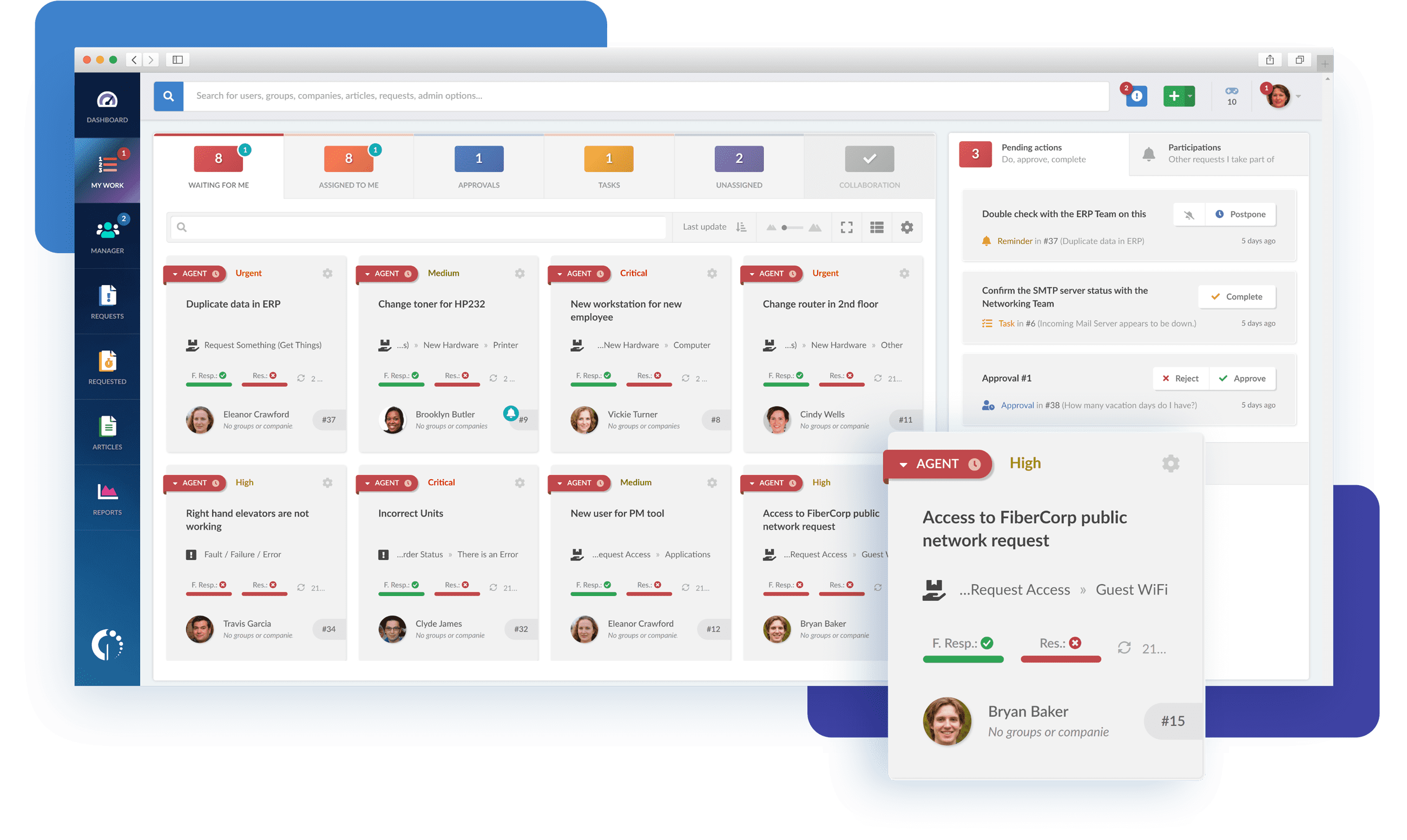
Robust Ticketing and Incident Management
InvGate Service Management stands out by offering robust Ticketing and Incident Management capabilities. It simplifies ticket tracking, collaboration, and resolution, enabling IT teams to handle and prioritize incidents efficiently. Features like automated ticket routing, customizable workflows, and SLA Management significantly enhance incident resolution efficiency.
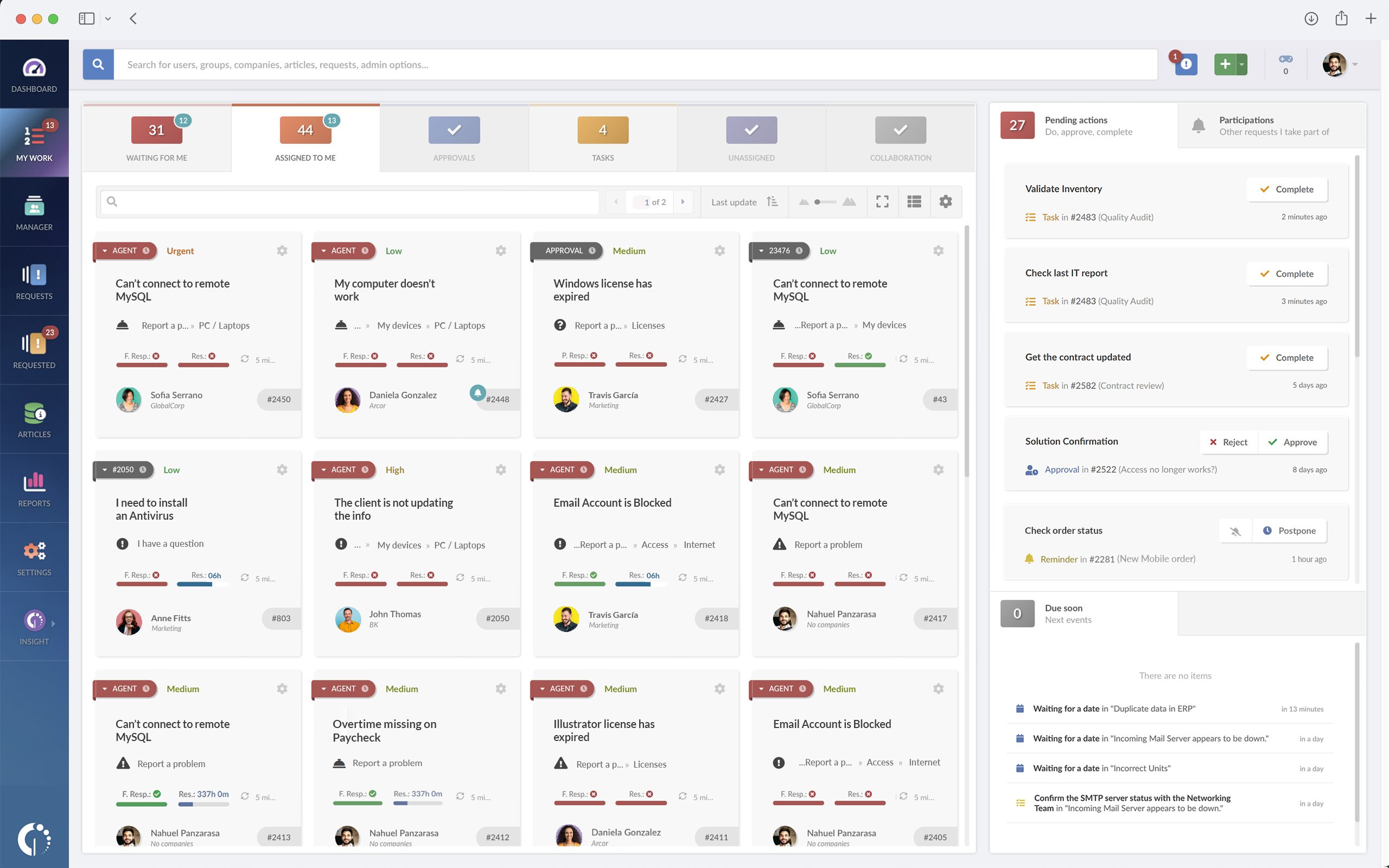
Comprehensive reporting and analytics
InvGate Service Management offers extensive reporting and analytics capabilities, allowing organizations to gain valuable insights into their IT operations and performance. The platform provides ready-made reports and customizable dashboards, enabling IT teams to analyze data, identify trends, and make informed decisions to improve their services.
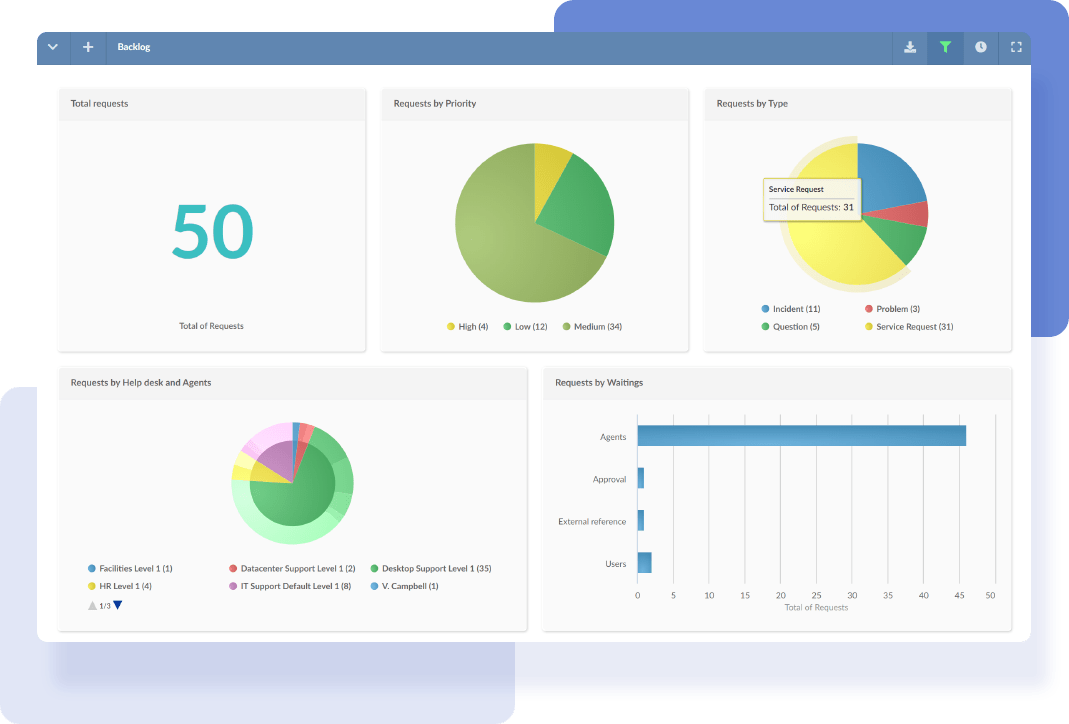
Powerful self-service capabilities
InvGate Service Management incorporates robust self-service functionalities, including an intuitive portal, an extensive IT service catalog, and a knowledge base. These functionalities empower end-users to independently resolve common issues, access a wide range of IT services, and utilize self-help resources, thereby reducing the workload on IT staff.
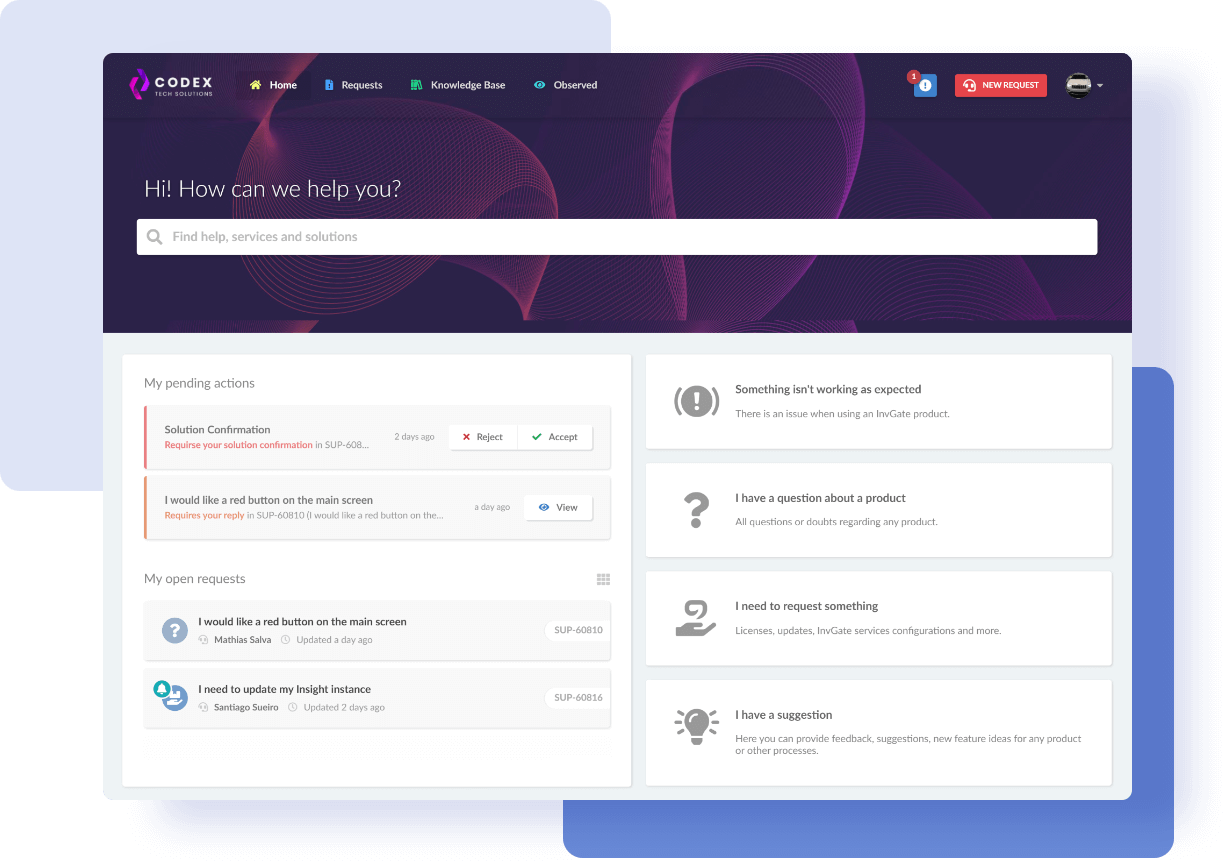
Customization and flexibility
InvGate Service Management provides flexible deployment options, offering organizations the choice between on-premise or cloud-based solutions. This flexibility ensures that the platform can adapt to the specific requirements of various sectors and industries.
Comprehensive Asset Management
By integrating InvGate Service Management with InvGate Asset Management, organizations gain a comprehensive view of their IT ecosystem, leading to improved service delivery and reduced downtime. InvGate Asset Management offers various features, including IT Asset Discovery, Inventory Management, Software License Management, and maintenance schedules.

Purpose-built for ITSM, perfect for ESM
InvGate Service Management is purpose-designed for ITSM while seamlessly extending its capabilities to Enterprise Service Management (ESM). It empowers operational departments to enhance their processes and fully embrace the benefits of digital transformation. With a primary focus on ITSM and strong performance in ESM, InvGate Service Management facilitates streamlined workflows and comprehensive digital transformation initiatives across all departments.
Cost-effective solution
InvGate Service Management delivers a cost-effective solution without compromising functionality. It offers a comprehensive range of ITSM features at a competitive price point, making it an attractive option for organizations seeking affordability without sacrificing capabilities. Compared to alternatives like SymphonyAI Summit Service Management and ServiceNow, InvGate Service Management strikes a balance between cost and functionality.
ITIL best practice compliance
InvGate Service Management has earned the prestigious PinkVERIFIED Certified certification, underscoring its commitment to upholding ITSM excellence. Whether organizations are embarking on their ITIL journey or managing complex operations, InvGate Service Management provides a user-friendly and feature-rich experience aligned with industry best practices.
Fast ROI and ongoing innovation
InvGate Service Management ensures a rapid return on investment through efficient implementation processes. Within weeks, organizations can start reaping the benefits of this robust ITSM solution. Additionally, regular feature updates keep users at the forefront of technology without incurring additional costs.
Next steps
The decision between SymphonyAI Summit Service Management vs. ServiceNow as your IT Service Management solution holds great significance. Each of these platforms brings its unique strengths and advantages, tailored to meet the diverse needs of organizations.
However, to ensure your decision is well-informed, it's essential to look beyond these two options. The ITSM landscape is rich with a variety of solutions, each with its own merits and capabilities.
In this context, InvGate Service Management emerges as a standout choice, offering a host of distinctive strengths that set it apart. Its intuitive interface enhances user navigation, while its robust feature set empowers organizations to streamline their operations effectively.
Explore our live demo to truly appreciate the value of InvGate Service Management!















